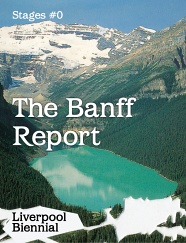
Editorial
Brent Bellamy, Vanessa Boni, Rosie Cooper, Laurie Peake
Stages 0 is the inaugural issue of Liverpool Biennial’s episodic online journal. Stages will act as a container for staging content generated from the Biennial’s year-round programme, thinking and research. Our approach to research in the context of Stages is exploratory and experimental, guided by how one might perform and embody practice and knowledge through editorial and design concerns.
Stages 0 presents a portfolio of thinking that emerged from the Banff Research in Culture (BRiC) residency titled ‘Dock(ing); or, New Economies of Exchange’. Lead by Joseph Grima, Suzanne Lacy, and Hakan Topal, alongside the Liverpool Biennial curatorial team, artists, activists, economists and historians took the residency theme as a starting point to collectively explore some of the social, political and cultural challenges we face at the outset of this new century. This multidisciplinary, multifaceted investigation opened new vantage points on long-standing problems, considering the politics played out on physical and metaphoric docks.
The liminal spaces to which docks point include legal, national, physical and conceptual borders of all kinds – spaces and places where power is exerted over identities and collectives, and so, too, sites where power is actively challenged with the aim of enabling new possibilities. In the case of the city of Liverpool, for instance, whose fortune was built through its position as a major European dock in the late 19th century, this includes the very real trials involved in re-constituting genuine civic life in the wake of de-industrialisation, the role played by art in this process, and the difficulties of creating new urban possibilities and opportunities that do not follow the problematic script of capitalist gentrification.
Amongst the contributions to Stages 0, Brent Bellamy imagines the conditions of post-industry through the lens of zombie fiction; Jeff Diamanti proposes a re-narration of postmodernism’s economic valences during the Venice Architecture Biennale’s early history; and Logan Sisley uses the Banff Springs Hotel as a case study in the import and export of local and national imagery within the leisure industry. Imre Szeman brings to our attention a major shaper in current global infrastructures: oil; whilst Nadine Attewell speaks more directly to Liverpool, asking how its history within the context of global trade and industry, inseparable from the transatlantic slave trade, continues to inform its present.
Together, these reflections constitute part of a context of collaborative thinking from which Liverpool Biennial can continue to address new possibilities for cultural practice through the lens of urbanism and pedagogy, considering not only its own history, present and future but also how that may map on to other situations, globally.
- Editorial
Brent Bellamy, Vanessa Boni, Rosie Cooper, Laurie Peake - The Returns of the Past
Nadine Attewell - New Economies of Exchange and the Zombies of Industry
Brent Bellamy - Reading Infrastructure. Theme Park in Paradise
Eva Castringius - The Shifting Sightlines of Montreal’s Silo no. 5
Morgan Charles - Postindustrialisation in the Present Tense
Jeff Diamanti - Using Strategies as Tactics: Liverpool Waters and Irrationality in Banff
Ryan Ferko - Inhabiting Histories
Kate Hoffman and Ada S. Jaarsma - A postcard from Banff
Logan Sisley - Natural Histories
Rafico Ruiz - Everything and Nothing
Fiona McDonald - Docking Infrastructures
Florian Sprenger - How to Know About Oil
Imre Szeman - Elevation and Cultural Theory
Michael Truscello - An Exercise in Understanding Distance
Xinran Yuan - BRiC Library
- Colophon